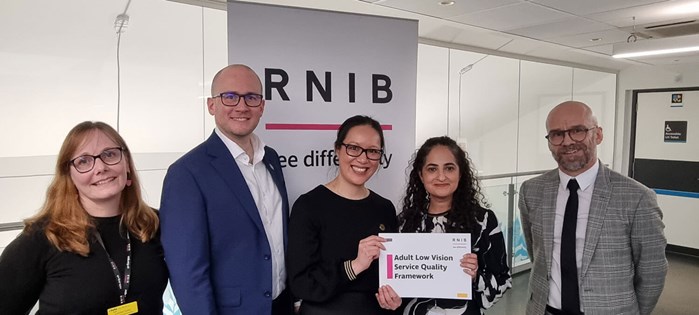The Royal National Institute of Blind People (RNIB) launched the development of a landmark set of guidelines and framework to help low vision clinics provide best practice care, which it unveiled on 21 February at a launch event at its state-of-the-art Low Vision Centre in the charity’s headquarters in London.
The comprehensive Low Vision Framework and accompanying good practice guidelines have been created in collaboration with blind and partially sighted people, as well as a cross-sector group of optometry specialists.
In addition to the framework, RNIB has created valuable training resources for staff and established referral routes from optometry. These resources are designed to enhance the overall experience for patients within these settings.
Recognising the growing trend towards the delivery of diagnostics and treatments in primary care, particularly within optometry, the framework also aims to arm healthcare professionals to better support patients whose low vision is causing them difficulties with day-to-day activities despite having the best glasses or contact lens correction.
Louise Gow, RNIB’s Clinical Lead for Eye Health, Optometry and Low Vision Services, said: “It’s crucial to ensure the unique needs of blind and partially sighted people as well as those awaiting or receiving a diagnosis of a sight-threatening condition, and those with low vision, are fully understood and addressed.
"We’re excited to introduce this pioneering Low Vision Framework, which represents a significant step towards a more inclusive and patient-centred approach in low-vision care and encourage optometrists to use the guidance and sign up for the e-learning resources.

Left to right: Louise Gow, clinical lead for eye health, optometry and low vision services (RNIB), Professor Leon Davies, president of College of Optometrists, Denise Voon from College of Optometrists, Preeti Singla, low vision engagement manager (RNIB) holding a copy of the Low Vision Framework, and Olivier Deneve, C.Opt.
Berni Warren, who has diabetic macular oedema, and helped in providing input into the guidance, said: “As someone with low vision, I can see the huge benefits that this framework and guidance will bring. “There’ve been times when I have found living with low vision both challenging and lonely. Not knowing who or how people could help me was really difficult. This framework will help to address these issues giving a much clearer understanding of what individual people need and when they need it. Thank you RNIB – this is exactly what people like me with low vision need.”
Keziah Latham, Professor of Optometry at Anglia Ruskin University, said: “This initiative gives everyone – including service users, clinicians, and commissioners – comprehensive evidence-based guidance on providing low vision services in line with best practice. I’ll be using these resources to enhance my own service provision.”
RNIB is already set to attend events this spring providing an opportunity to share insights, gather feedback, and foster wider adoption of the Low Vision Framework within the healthcare community.
For more information on low vision services, visit the RNIB website.



